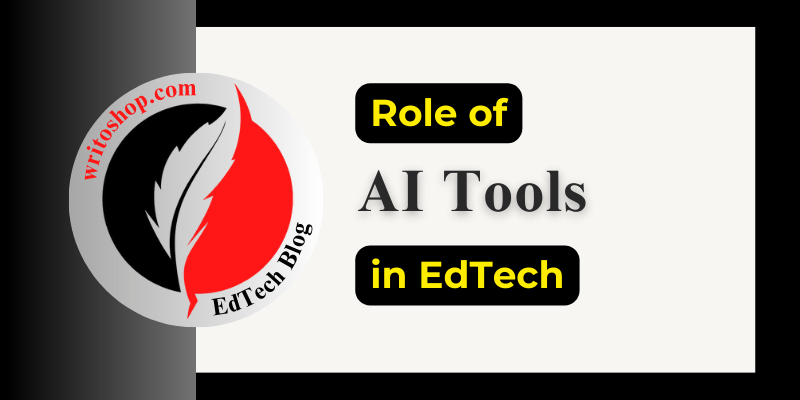
Imagine a world where personalized learning isn’t a luxury but a standard practice. Where students receive tailored lessons, educators save hours of planning, and administrative tasks run seamlessly. Thanks to Artificial Intelligence (AI), this vision is becoming a reality in educational technology.
From reshaping classrooms to streamlining operations, AI tools are revolutionizing how we teach, learn, and manage education systems. This blog explores the dynamic role of AI in edtech, its benefits, and potential challenges, while offering a glimpse into its future.
Why Does AI Matters in Education?
AI isn’t just a buzzword; it’s a game-changer for education. By automating processes and delivering personalized learning experiences, AI empowers educators to focus on what truly matters: teaching.
Key Reasons AI is Reshaping Education:
Efficiency: Automates repetitive tasks like grading and attendance.
Accessibility: Makes education inclusive for students with diverse needs.
Engagement: Enhances learning experiences with interactive tools and gamification.
AI Tools Revolutionizing Edtech
Let’s dive into some AI tools that are transforming education at every level.
AI-Powered Learning Platforms
These platforms adapt to a student’s learning pace and style. They provide personalized lesson plans, quizzes, and even real-time feedback.
Examples:
- Duolingo for language learning.
- Khan Academy’s AI features for customized math lessons.
Automated Grading Systems
Gone are the days of manual grading. AI tools now assess tests, essays, and assignments with remarkable accuracy.
Benefits:
- Saves teachers hours of work.
- Provides instant feedback to students.
Virtual Tutors
AI-driven chatbots and virtual assistants offer 24/7 support for students. They answer queries, explain concepts, and provide study resources.
Popular Tools:
- ChatGPT for tutoring assistance.
- ScribeSense for note-taking and organization.
AI in Administrative Tasks
AI handles everything from enrollment to attendance tracking, allowing schools to run efficiently.
Applications:
- Streamlined student record management.
- Automated scheduling and resource allocation.
Benefits of AI in Education
AI isn’t just about technology; it’s about improving outcomes for students, teachers, and institutions alike.
For Students
Personalized Learning: Tailored lessons cater to individual needs.
24/7 Access: AI-powered platforms make learning flexible and accessible anytime.
Improved Retention: Engaging, gamified content makes concepts easier to grasp.
For Teachers
More Time for Teaching: By automating grading and admin work, teachers can focus on lesson planning and student interaction.
Enhanced Insights: AI analytics provide data on student performance, helping teachers identify and address weaknesses.
For Institutions
Cost Efficiency: AI reduces the need for manual labor in administrative tasks.
Scalability: Institutions can manage large volumes of students without compromising on quality.
Real-World Success Stories
Google AI in Classrooms: Google’s AI tools, like Google Classroom, have simplified communication and assignment tracking for teachers and students worldwide.
Smart Content with Cram101: Cram101 uses AI to condense textbooks into digestible summaries, making studying more efficient.
Carnegie Learning’s AI Tutor: This platform uses AI to guide students through difficult math concepts with step-by-step instructions.
Challenges and Ethical Considerations
While AI in EdTech has incredible potential, it’s not without challenges.
Data Privacy and Security: AI systems rely on massive amounts of data, raising concerns about how this data is stored and used.
Bias in AI Algorithms: Poorly designed algorithms can perpetuate biases, leading to unequal opportunities for students.
Teacher Dependency on Technology: Over-reliance on AI might reduce a teacher’s role, which could impact the human touch in education.
How to Implement AI Tools Effectively?
Tips for Schools and Institutions
Start Small: Begin with AI tools for specific tasks like grading or attendance.
Train Teachers: Equip educators with the knowledge to use AI tools effectively.
Monitor Outcomes: Regularly evaluate the impact of AI on learning outcomes.
Tips for Educators
Use AI for Insights: Analyze data to understand student needs better.
Combine AI with Traditional Teaching: Use AI as a supplement, not a replacement.
Stay Updated: Continuously learn about new AI tools and trends.
The Future of AI in Educational Technology
As AI continues to evolve, its role in education will only grow. Future advancements might include:
Immersive Learning with AI: Virtual reality (VR) combined with AI for experiential education.
Hyper-Personalized Curriculum: AI crafting unique learning paths for every student.
AI for Emotional Intelligence: Tools that detect and address students’ emotional states.
Conclusion
The use of AI tools in educational technology is more than a trend—it’s a transformative force.
From personalized learning to administrative efficiency, AI is unlocking new possibilities for students, educators, and institutions.
By embracing these tools thoughtfully and ethically, we can create an education system that is not only smarter but also more inclusive and effective.
Start integrating AI tools today to stay ahead in the evolving world of education!
